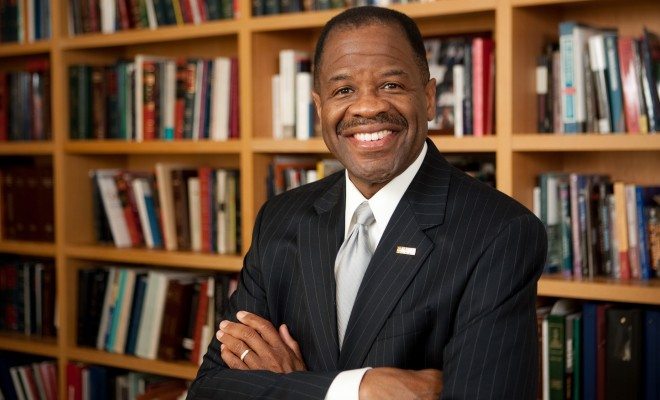 Image courtesy of [Wake Forest University School of Law via Flickr]
Image courtesy of [Wake Forest University School of Law via Flickr]
Schools
Welcome to the 110th AALS Annual Meeting: What’s Going on in the Law School World?
Law school students and professors all over the country are marching back to their universities as they begin their first official semester of 2016. Some may be dragging their feet, though, as they think about the events of the previous year. Law school enrollment continued to fall, and some law professionals have seen pay cuts as a result of the aftermath of the recession. Thankfully, a new year brings new and innovative possibilities in the form of the Association of American Law Schools. Their Annual Meeting this year addressed important issues such as lowering law school drop-out rates and finding jobs for students post-graduation. Here’s what I learned when I attended the 110th Association of American Law Schools Annual Meeting in New York City as a correspondent for Law Street Media:
The event is the largest worldwide gathering of law faculty and staff, featuring over 800 speakers and attendees from 179 different law schools. I sat in on the session for first-time attendees to get an overview of the AALS conference, and to speak with other people who were also experiencing the Annual Meeting for the first time. The “greeter” panel consisted of Executive Director Judith Areen, Bradley A. Areheart, current AALS president Blake D. Morant, incoming AALS president Kellye Y. Testy, and Michael E. Waterstone. The panel spoke frankly about the high cost of attendance for the conference, and announced that they will continue to extend deep discounts for new teachers. Areheart stressed the importance of networking opportunities during the conference and encouraged the audience of law professionals to make time to meet new people and swap stories about their experiences in their particular fields of study.
Morant warmly greeted all newcomers in the audience and similarly encouraged everyone to take ownership of their experience at the AALS conference, no matter if they were a first year teacher or seasoned professor. After the panel, I asked what led him to create this year’s AALS Annual Meeting theme, “From Challenge to Innovation: Legal Education in 2016.” He noted that law professionals as well as law schools are still feeling the negative effects of the most recent recession, in terms of a downturn in the number of available jobs.
“One of the things I’ve noticed is that law schools are re-tooling,” Morant explained:
Law schools have put in innovations such as externships along with practicums. All of these things show synergy between what they learn in the classroom and what happens in the real world, and that has been hugely innovative. So as I came up with the theme, I said, oh my goodness, everything has changed! But I think law schools are innovating, and adapting to that challenge.
Morant also reasoned that practical experience teaches students professionalism, a hugely important skill that law school graduates must learn.
Associate Professor of Law, Virginia Harper Ho from the University of Kansas School of Law echoed Morant’s sentiments, and predicts that the effects of the financial crisis will cause further structural shifts in the legal profession as well as academia. She shares a desire to prepare her students as well as she possibly can for the “real world,” which may in fact include more access to externships and practical experiences.
As the “first-timers” meeting continued, there was much excitement surrounding a session called the Arc of Career. When I spoke with Professor Jennifer Rosa from Michigan State University College of Law, she said that her attendance at this year’s AALS conference was largely due to the relevant programming, including sessions surrounding the arc of a law professor’s career.
Many law professionals in the meeting room of AALS expressed that after they overcame the initial fear of starting a career in law or education, they wanted more guidance or feedback once they hit their mid-career stride. Specifically, Rosa voiced her interest in becoming established in academia as a writer now that she has cultivated her pedagogical voice.
Rosa has taught Street Law for the past 11 years. The course includes community outreach, “where professors train law students to go out into the high schools and teach high school students aspects of the law that would apply to them.” The course has evolved to include the use of podcasts as a teaching tool. Rosa has also created videos for an organization called LegalED. Video content on LegalED is modeled after the popular TED Talk format. The organization seeks to use the power of the internet for legal education. Professors all over the United States are putting the 2016 AALS theme into practice, using technology to respond to unique challenges in their classrooms that could not have even been foreseen five or six years ago.
AALS gives people like Professor Rosa and Professor Harper Ho a rare chance to connect with other law professionals from schools all around the country. Over the course of several days, they attended specific sessions that were organized according to different hot topics in law. After the initial meeting, I went on to attend two sessions: one entitled “Law and Religion,” which discussed religious responses to same-sex marriage, and one called “Civil Rights,” which examined civil rights movements in the 21st century. Stay tuned for recaps and responses from these two sessions.








Comments